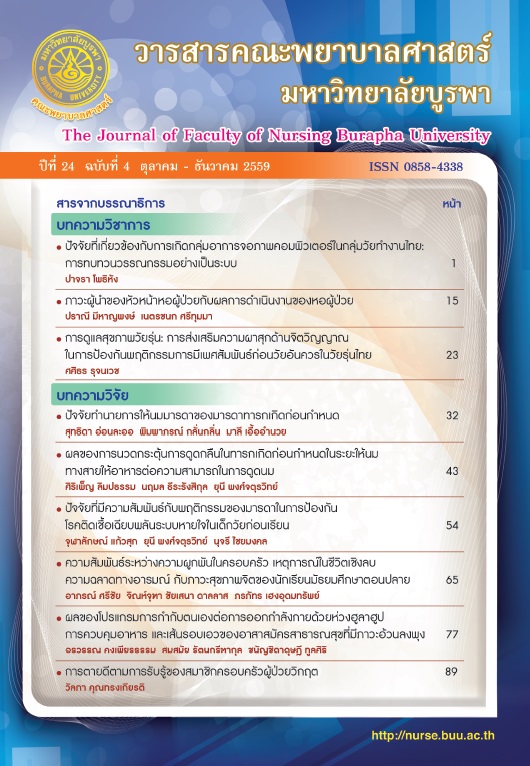ปัจจัยทำนายการให้นมมารดาของมารดาทารกเกิดก่อนกำหนด
คำสำคัญ:
การให้นมมารดา, ทารกเกิดก่อนกำหนด, สมรรถนะแห่งตน, ความรู้ในการให้นมมารดา, การสนับสนุนทางสังคม, Breastfeeding, preterm Infants, self-efficacy, breastfeeding knowledge, social supportบทคัดย่อ
การวิจัยนี้เป็นการศึกษาแบบหาความสัมพันธ์เชิงทำนาย มีวัตถุประสงค์เพื่อศึกษาอำนาจการทำนายของสมรรถนะแห่งตน ความรู้ในการให้นมมารดา การสนับสนุนทางสังคมจากสามี และการสนับสนุนทางสังคมจากสมาชิกอื่นในครอบครัวต่อการให้นมมารดาของมารดาทารกเกิดก่อนกำหนด กลุ่มตัวอย่าง คือ มารดาของทารกเกิดก่อนกำหนดที่มีอายุหลังปรับแล้ว 3-6 เดือน ที่เข้ารับบริการสุขภาพที่คลินิกเด็กของโรงพยาบาลมหาราชนครเชียงใหม่ โรงพยาบาลส่งเสริมสุขภาพเชียงใหม่ โรงพยาบาลเชียงรายประชานุเคราะห์ โรงพยาบาลลำปาง โรงพยาบาลลำพูน หรือโรงพยาบาลพุทธชินราชพิษณุโลก จำนวน 125 คน รวมรวมข้อมูลโดยใช้แบบสอบถามการให้นมมารดา สมรรถนะแห่งตน ความรู้เรื่องการให้นมมารดา การสนับสนุนทางสังคมจากสามีและสมาชิกอื่นในครอบครัวในการให้นมมารดาของมารดาทารกเกิดก่อนกำหนด วิเคราะห์ข้อมูลโดยใช้สถิติเชิงพรรณนา และการวิเคราะห์การถดถอยแบบโลจิสติก
ผลการวิจัยพบว่า มารดาร้อยละ 75.2 ให้นมมารดาแก่ทารกเกิดก่อนกำหนด ในจำนวนนี้ร้อยละ 16.0 ให้นมมารดาอย่างเดียว ร้อยละ 36.8 ให้นมมารดาร่วมกับนมผสม และร้อยละ 22.4 ให้นมมารดาร่วมกับอาหารอื่น มารดาร้อยละ 50.4 มีคะแนนสมรรถนะแห่งตนในการให้นมมารดาอยู่ในระดับสูง ร้อยละ 52.8 มีคะแนนความรู้ในการให้นมมารดาอยู่ในระดับปานกลาง มีคะแนนการสนับสนุนทางสังคมจากสามีและการสนับสนุนทางสังคมจากสมาชิกอื่นในครอบครัวในการให้นมมารดาอยู่ในระดับปานกลางร้อยละ 45.6 และ 48.8 ตามลำดับ สมรรถนะแห่งตนและการสนับสนุนทางสังคมจากสมาชิกอื่นในครอบครัวสามารถทำนายการให้นมมารดาของมารดาทารกเกิดก่อนกำหนดได้ร้อยละ 67 อย่างมีนัยสำคัญทางสถิติ (R2 = .67, p < .05) ผลการวิจัยครั้งนี้ได้ข้อมูลพื้นฐาน
เกี่ยวกับอิทธิพลของสมรรถนะแห่งตนและการสนับสนุนทางสังคมจากสมาชิกอื่นในครอบครัวต่อการให้นมมารดาของมารดาทารกเกิดก่อนกำหนด และสามารถนำไปใช้ในการวางแผนเพื่อให้การส่งเสริมมารดาในการให้นมมารดาแก่ทารกเกิดก่อนกำหนดต่อไป
The purpose of this predictive correlational research study was to determine the predictability of self-efficacy, knowledge breastfeeding, and social support from husband and family members regarding breastfeeding for preterm infant among mothers. Participants consisted of mothers of preterm infants with corrected age of 3-6 months who attended health services at the outpatient pediatric departments of Maharaj Nakorn Chiang Mai Hospital, Health Promotion Chiang Mai Hospital, Chiang Rai Prachanukhro Hospital, Lamphang Hospital, Lamphun Hospital or Buddhachinaraj Hospital. The participants were 125 mothers of preterm infants. Data were collected by using of questionnaires assessing for breastfeeding self-efficacy, breastfeeding knowledge, and social support from husband and family members regarding breastfeeding for preterm mothers. Data were analyzed by using descriptive statistic and logistic regression analysis.
This result revealed that: 75.2% of mothers fed breast milk to their baby, 16.0% of mothers fed exclusive breastfeeding, 36.8% of mothers fed partial breastfeeding and 22.4% of mothers fed breast milk with supplementary food. 50.4% of the mothers had breastfeeding self-efficacy scores at a high level, 52.8% of the mothers had breastfeeding knowledge score at a moderate level, and social support from husband and social support from family members regarding breastfeeding were at moderate level of 45.6% and 48.8%, respectively. It was found that breastfeeding self-efficacy and social support from family members could predict breastfeeding of preterm infant among mothers at 67% (R2 = .67, p < .05). The results of this study provides baseline data regarding influencing factors of self-efficacy and social support from family members on breastfeeding of preterm mothers and could be used as information for breastfeeding promotion among mothers of preterm infants.





